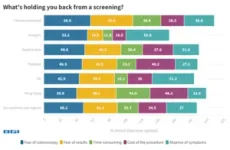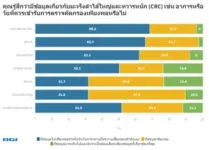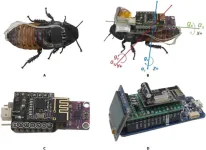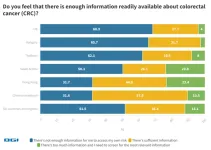(Press-News.org) PLYMOUTH MEETING, PA [April 12, 2023] — The NCCN 2023 Annual Conference took place in-person in Orlando and virtually, with a particular focus on human connection. That connection was underscored with more than 2,000 registrants from across the continuum of cancer care, including approximately 1,000 who returned in-person for the first time since 2019. Educational sessions highlighted the importance of ensuring care meets the latest standards while also rejecting a one-size-fits-all approach.
“At NCCN, we don’t shy away from difficult discussions; we want our conference attendees to take away the message that it is not just okay, but imperative to ask tough questions,” said Robert W. Carlson, MD, Chief Executive Officer, NCCN. “The experts behind the evidence-based updates in the NCCN Guidelines have an opportunity to discuss their recommendations with the care providers who follow them. This year’s program included multiple sessions dedicated to finding solutions for challenges, such as systemic bias, social determinants of health, and staffing issues, that can reduce people’s access to the best possible cancer care.”
One question that came up again and again was: “Who are we missing?” This was examined during a plenary session on Best Practices for Addressing the Health Needs of the LGBTQ+ Community in Oncology Care, where speakers highlighted the lack of data on sexual orientation and gender identity in people with cancer. Panel participants also discussed how experiences with bias and misunderstanding can make people reluctant to engage with necessary health care. There can be added complications for people who have faced rejection from their biological family, or hardships like food insecurity or a lack of safe spaces in their community.
“People will come to you if you let them know that it’s safe for them to come to you,” explained Shail Maingi, MD, Dana-Farber Cancer Institute, while discussing how to alleviate mistrust. “If your practice shows it is affirming and can do trauma-informed care, people will travel from all over to see you. When I walk into a room, I don’t make assumptions about who is with the patient. And at the end of the encounter, I always ask ‘is there anything more you want to talk about?’”
The question of “Who are we missing?” came up again in multiple sessions focused on increasing equity in cancer care. Topics included: Programs to Reduce Hospital Admissions and Readmissions; Sexual Identity and Function in Patients with Cancer and Survivors; Cancer Screening in Underrepresented Populations; and Social Determinants of Health: Collection, Integration, and Intervention.
In another plenary session—this one focused on Sleep Disorders, Fatigue, and Cognitive Function in Cancer Survivors—speakers again noted a lack of data. The panelists explained that there is good evidence that physical activity can help with cancer-related fatigue. But when it comes to other interventions dealing with sleep disorders and cognitive impairment, a lot more research is needed. Panelists also cautioned: “These are individualized experiences that require individualized consultation with the patient and provider.”
Reducing staff burnout and turnover is another area where asking the right question can go a long way. In a plenary session on Health System Recruitment and Retention Strategies, speakers pointed out how the aftermath of the COVID-19 pandemic has caused everyone to reassess their lives and priorities. It also accelerated an already-looming workforce shortage in oncology. The panel participants found that the best way to retain high-value employees was to listen to them, support their needs, and keep them on a path that was both challenging and fulfilling.
“We want to make sure that we start that conversation on day one of employment and even earlier during interviews. We discuss not just the job expectations, but also ask ‘what do you really want, where do you see yourself in the future, and what are your long-term goals?’ Making a connection with the individual employee is important and keeping that ongoing connection is critical,” said Rebecca L. Caires, MBA, Robert H. Lurie Comprehensive Cancer Center of Northwestern University, a member of the NCCN Board of Directors.
The NCCN 2023 Annual Conference also featured many discussions about the latest research from the past year, and how expert NCCN Guidelines® Panel Members use it to inform current clinical practice recommendations. Attendees were invited to “Continue the Conversation” in small group settings for informal discussions immediately following some of the sessions.
The conference included more than 100 abstract poster presentations featuring original research data in a variety of oncology-related categories, which are now available at JNCCN.org, the online home of JNCCN—Journal of the National Comprehensive Cancer Network. “Follow the Experts” guided tours delved deeper into dozens of poster abstracts showcasing cutting-edge research on cancer treatment and delivery. There were oral presentations for the top five highest-scoring abstracts, and NCCN Foundation Young Investigator Awards recipients also showcased oral presentations on their findings.
For those attending in-person, there were also numerous opportunities for networking in the live Exhibit Hall and at a poolside reception.
Save the date: NCCN will return to the Marriott World Center in Orlando for the NCCN 2024 Annual Conference April 5—7, 2024. Before then, there will be two NCCN Policy Summits and one NCCN Patient Advocacy Summit in Washington, D.C., and the NCCN 2023 Annual Congress: Hematologic Malignancies™ in San Francisco September 22—23, 2023. Visit NCCN.org for a full calendar of upcoming events.
# # #
About the National Comprehensive Cancer Network
The National Comprehensive Cancer Network® (NCCN®) is a not-for-profit alliance of leading cancer centers devoted to patient care, research, and education. NCCN is dedicated to improving and facilitating quality, effective, equitable, and accessible cancer care so all patients can live better lives. The NCCN Clinical Practice Guidelines in Oncology (NCCN Guidelines®) provide transparent, evidence-based, expert consensus recommendations for cancer treatment, prevention, and supportive services; they are the recognized standard for clinical direction and policy in cancer management and the most thorough and frequently-updated clinical practice guidelines available in any area of medicine. The NCCN Guidelines for Patients® provide expert cancer treatment information to inform and empower patients and caregivers, through support from the NCCN Foundation®. NCCN also advances continuing education, global initiatives, policy, and research collaboration and publication in oncology. Visit NCCN.org for more information.
END
Insilico Medicine (“Insilico”), a clinical-stage generative artificial intelligence (AI)-driven drug discovery company, today announced that it has successfully discovered a potent, selective, and orally bioavailable small molecule inhibitor of CDK8 for the treatment of cancer using a structure-based generative chemistry approach enabled by the Chemistry42 multi-modal generative reinforcement learning platform. The research was published in the American Chemical Society’s Journal of Medicinal Chemistry, a leading journal in medicinal chemistry.
As members of the CDK family, CDK8 and its paralog protein CDK19 play critical roles in regulating transcription of ...
Have you ever wondered why some insects like cockroaches prefer to stay or decrease movement in darkness? Some may tell you it’s called photophobia, a habit deeply coded in their genes. A further question would be whether we can correct this habit of cockroaches, that is, moving in the darkness just as they move in bright backgrounds. Scientists from Osaka University may have answered this question with a positive answer. They solved this question by converting a cockroach into a cyborg. They published this research in the journal Cyborg and Bionic Systems. ...
SAN ANTONIO — April 12, 2023—Southwest Research Institute will contribute to a new NASA institute to improve understanding and enable rapid certification of metal parts created using advanced additive manufacturing (AM) techniques. The Institute for Model-based Qualification & Certification of Additive Manufacturing (IMQCAM) will work to improve computer models of additively manufactured metal parts and expand their utility in spaceflight applications.
Additive manufacturing uses 3D printing or rapid prototyping to build ...
Physicians and scientists from Memorial Sloan Kettering Cancer Center (MSK) will join oncology experts and members of the global cancer research community to present the latest advances in cancer during the American Association for Cancer Research (AACR) Annual Meeting on April 14-19 in Orlando, Florida.
MSK experts will present significant research and will be available to comment on topics including cancer disparities, analytical tools for precision medicine, genomic biomarkers, tumor biology, immunology and more.
Deb Schrag, MD, MPH, will offer insights ...
Roland Martin, MD, a world-class neurologist and investigator, is the winner of the 2023 John Dystel Prize for MS Research. He is being honored for advancing our understanding of immune mechanisms underlying multiple sclerosis and translating them to develop innovative strategies to treat the disease.
Martin uncovered how key MS susceptibility genes are involved in launching immune attacks on the nervous system and identified specific components of nerve-insulating myelin that are targeted by those attacks. His team has developed an experimental therapy designed to make ...
Colorectal cancer (CRC) is the fourth most common cancer and accounts for 11% of the cancer burden in Thailand in 2020, with over 21,000 new CRC cases annually, and stage III and IV CRC account for up to 70%–80% of overall CRC cases, according to the Society of Colorectal Surgeons of Thailand.
This report indicates Thailand has a high percentage of respondents (62.1%) who feel they lack CRC information to assess their risk, far higher than global average of 51.5%. In addition, 48.2% of Thais say that cost concerns are holding them back from CRC screening, way higher than global average of ...
First study to do apples-to-apples comparison of residential treatment use among Medicaid enrollees across several states
Nine states represent 14.9 million people (20% of all Medicaid enrollees)
CHICAGO --- Approximately 7 million adults in the U.S. are living with opioid use disorder (OUD). Yet a new Northwestern Medicine study that measured residential treatment use among Medicaid enrollees across nine states found only 7% of enrollees with OUD received residential treatment, an integral part of the recovery process ...
Researchers from NC State University and Texas A&M University published a new Journal of Marketing article that examines membership fee shipping programs and the effect on consumers’ purchase behaviors and company net revenue.
The study, forthcoming in the Journal of Marketing, is titled “The Effectiveness of Membership-Based Free Shipping: An Empirical Investigation of Consumers’ Purchase Behaviors and Revenue Contribution” and is authored by Fangfei Guo and Yan Liu.
What is the top reason 50% of customers abandon items in online shopping carts? Why do e-commerce brands incur an annual revenue loss of about ...
Whether wriggling your toes or lifting groceries, muscles in your body smoothly expand and contract. Some polymers can do the same thing — acting like artificial muscles — but only when stimulated by dangerously high voltages. Now, researchers in ACS Applied Materials & Interfaces report a series of thin, elastic films that respond to substantially lower electrical charges. The materials represent a step toward artificial muscles that could someday operate safely in medical devices.
Artificial muscles could become key components of movable soft robotic implants and functional artificial organs. Electroactive elastomers, such as bottlebrush polymers, are attractive ...
Developing and testing new treatments or vaccines for humans almost always requires animal trials, but these experiments can sometimes take years to complete and can raise ethical concerns about the animals’ treatment. Now, researchers reporting in ACS Central Science have developed a new testing platform that encapsulates B cells — some of the most important components of the immune system — into miniature “organoids” to make vaccine screening quicker and greatly reduce the number of animals needed.
Vaccines ...








